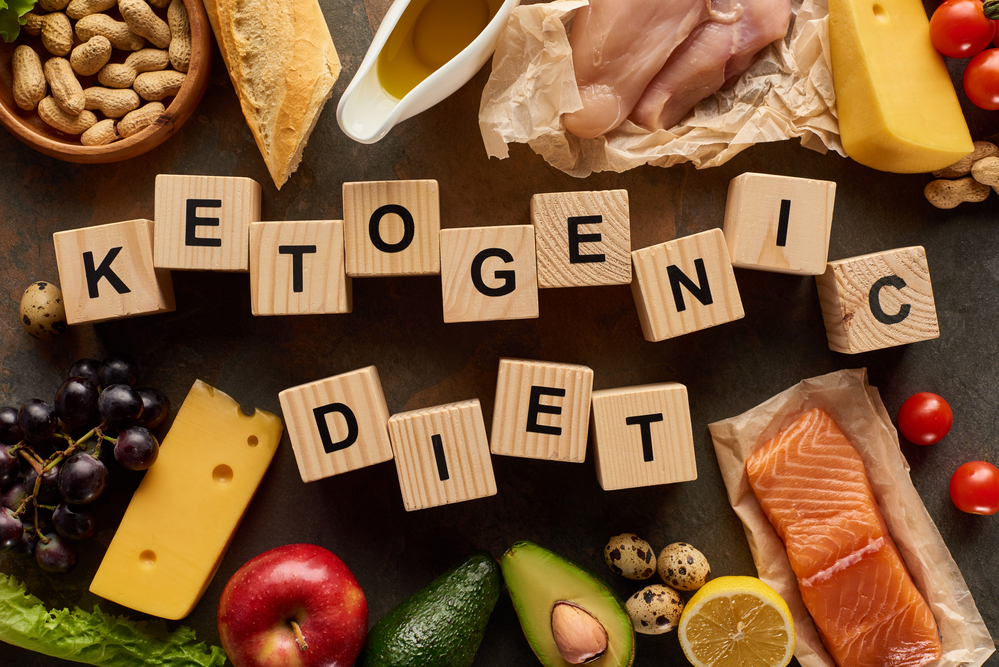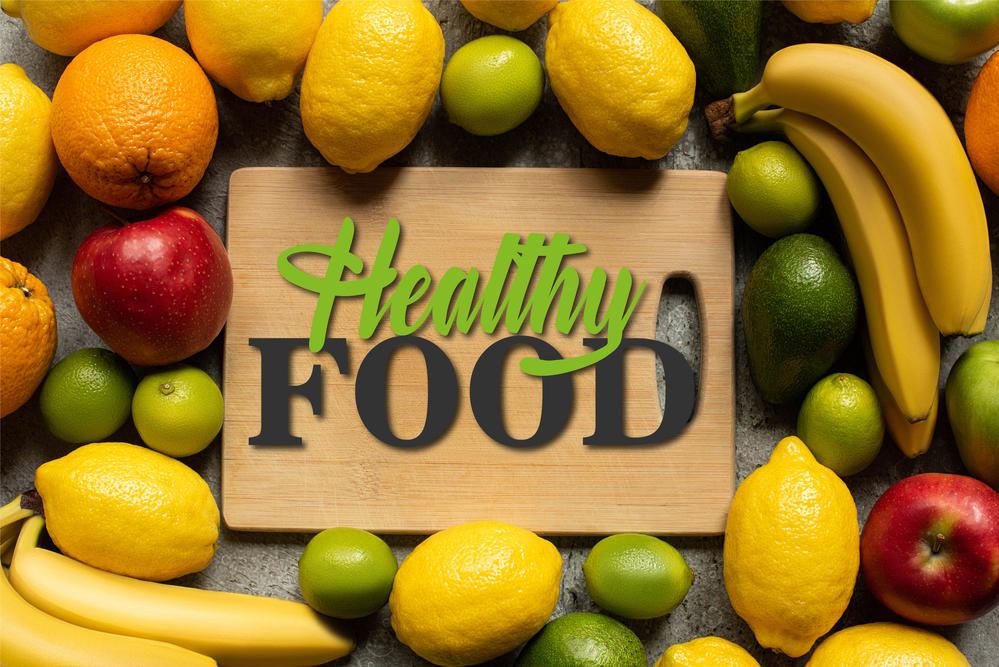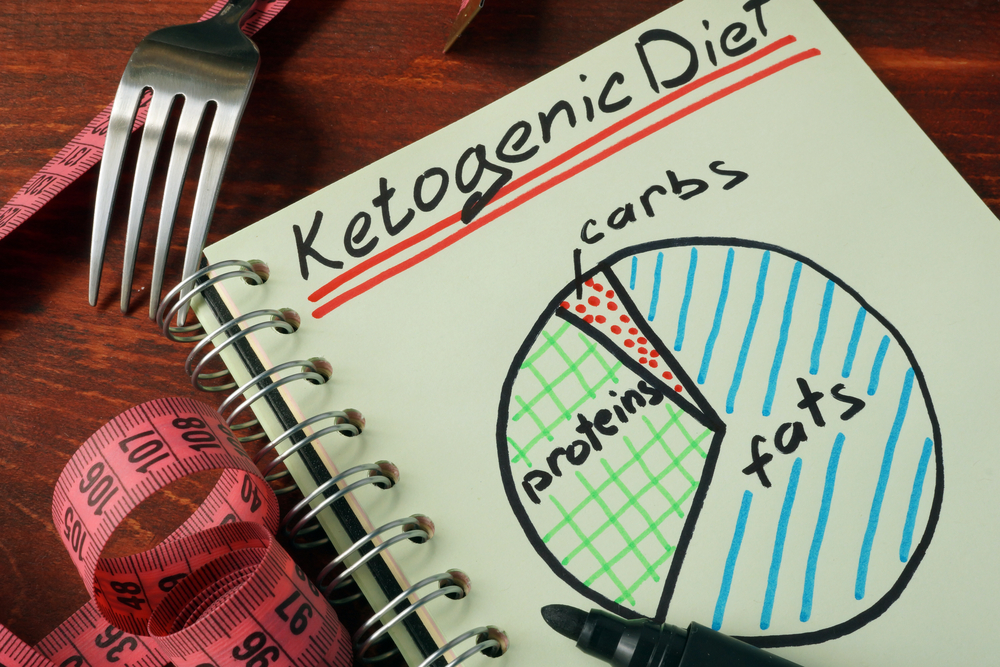
Losing weight with a ketogenic diet
Are you determined and do you really want to lose those extra kilos? For instance, because you gained weight after a pregnancy, because your favourite pair of trousers just don't fit anymore or simply because it is better for your health and mood? Then losing weight with a ketogenic diet might be for you. Losing weight with keto has been very popular in recent years. But what is a keto diet and how (quickly) can you actually lose weight with it? We tell you in this blog.
What is a ketogenic diet

A ketogenic diet is a way of eating in which carbohydrate intake is severely restricted and fat intake is actually increased. The essence of this diet is to induce a metabolic state called ketosis. Normally, the body uses carbohydrates as the primary source of energy, but when carbohydrates are in short supply, as in the case of a ketogenic diet, the body switches to fats as an alternative energy source.
When you eat few carbohydrates, blood glucose levels drop, which is normally the main source of energy for your body. In response, the liver starts converting fats into ketones, a type of fuel. These ketones are then used as a source of energy for both the brain and other organs. This process is called ketosis and causes the body to burn fats efficiently.
The keto diet has its origins in the 1920s, when it was developed as a medical treatment for epilepsy. Over time, it was discovered that a reduced intake of carbohydrates could also be effective for weight loss. Today, the diet enjoys popularity, thanks in part to its many success stories and media attention. A major appeal of the keto diet lies in its potential benefits such as improved blood sugar levels and reduced feelings of hunger while losing weight
Ketogenic diet and losing weight

Losing weight with a keto diet is very popular.But why do people actually choose this way of losing weight? A key benefit is that when you are in ketosis, your body gets energy from fats. This leads to faster and more efficient fat burning. Because fats have a high satiety level, the keto diet also contributes to a reduced appetite. This makes it easier to eat less without feeling hungry.
In addition, many people who follow the keto diet experience more energy and better sports performance. This may be due to the constant energy supply of ketones, as opposed to the fluctuations in energy often experienced with a diet rich in carbohydrates. Another important benefit is the potentially stabilising effect on blood sugar levels. This may be especially beneficial for people with type 2 diabetes or those looking to regulate their blood sugar levels. Stanford Medicine previously published about the benefits of a ketogenic diet in this area. Another popular diet rich in fats is the Mediterranean diet, to which similar health benefits are attributed.
Moreover, the keto diet is sustainable in the long term for many people. Unlike many other diets, the keto diet allows you to eat many different products, making it feel less like a diet over time. Many people find pleasure in preparing and eating keto-friendly meals, which can make every meal feel like a 'party'. This aspect of enjoying eating while losing weight contributes to the popularity and success of the keto diet.
How much do you lose weight with keto

If you want to lose weight with keto, it is of course nice to know exactly how fast it goes. To get straight to the point: this is different for everyone. What you lose in weight per week depends on several factors, such as your starting weight, your metabolic rate and how much you exercise. But how much do you lose in keto if we look at the average? If you follow the keto diet and are actually in ketosis, you will lose between 0.5 kg and 1 kg per week on average.
However, it is important to note that weight loss, especially in the initial phase, does not only consist of fat loss. Part of the initial weight loss may be due to the loss of water weight, as low-carbohydrate diets often lead to a decrease in the storage of glycogen (a form of stored glucose), which retains water. As your body adapts to the diet and reaches ketosis, weight loss will consist more of fat loss.
It is also important to stress that a healthy speed of losing weight is more important than the speed itself. Losing weight faster is not necessarily better or healthier. Moreover, sustainability and a balanced nutritional approach are crucial for long-term success. Anyone considering a keto diet, especially for significant weight loss, should ideally do so under the guidance of a health professional. This helps to ensure that the diet is followed in a healthy and safe manner.
Ketogenic eating, how to do it
Of course, losing weight with a keto diet is only possible if you get the right amount of carbohydrates and eat or not eat certain products. To go into ketosis, you avoid high-carbohydrate foods such as pasta, bread, rice, potatoes and sugar. Instead, you focus on healthy fats, proteins and green leafy vegetables. Below is a detailed list of foods typically avoided or correctly consumed in a ketogenic diet:
Foods to avoid
- High-carbohydrate foods: This includes foods such as pasta, bread, rice, potatoes, and most cereals. These foods are rich in carbohydrates, which the body converts into glucose and can interrupt ketosis.
- Sugar-rich foods: Sugar, sweets, soft drinks, fruit juices, and sweet baked goods should be avoided because of their high carbohydrate content.
- Certain dairy products: High-carbohydrate milk and yoghurt are not recommended.
- Processed foods: Many processed foods contain hidden sugars and carbohydrates.
- Certain fruits: Fruits with high sugar content, such as bananas, apples, oranges, and grapes, are usually avoided.
Foods to eat
- Fats: Healthy fats are crucial in a keto diet. This includes foods such as avocados, olive oil, coconut oil, butter, and lard.
- Proteins: Moderate amounts of protein are important. Choose meat, poultry, fish, seafood, and eggs.
- Oily fish: Salmon, mackerel, tuna, and sardines are excellent sources of healthy fats and protein.
- Low-carbohydrate vegetables: Green leafy vegetables such as spinach, kale, and lettuce, as well as broccoli, cauliflower, and courgette are good options.
- Nuts and seeds: Unsalted nuts and seeds such as almonds, walnuts, flaxseeds, and chia seeds are rich in fats and low in carbohydrates.
- Cheese and whole dairy products: Whole, unprocessed cheese, full-fat Greek yoghurt, and cream are allowed because of their low-carbohydrate and high-fat content.
- Berries: Certain berries, such as raspberries, strawberries, and blueberries, can be eaten in limited quantities because they are relatively low in carbohydrates.
Key considerations
- Macronutrient ratio: It is essential to maintain the right ratio of fats, proteins, and carbohydrates. Typically, the focus is about 70-80% fats, 15-20% proteins, and 5-10% carbohydrates.
- Hydration and electrolytes: It is important to stay hydrated and make sure you get enough electrolytes, as the keto diet can have a diuretic effect.
- Portion control and total calories: Although the keto diet is not necessarily a calorie-restrictive diet, it is important to be aware of portion sizes and total calorie intake.
Following a ketogenic diet requires careful planning and attention to what you eat. It is also advisable to seek professional medical advice before starting
Keto supplements for support
If you want to lose weight, following a ketogenic diet is definitely recommended. You will lose weight with this if you make a good effort, consume the right food and exercise regularly. To get into ketosis, it is important to limit carbohydrates in your diet, but you can speed up this process a bit by taking keto supplements, for instance the well-known Keto Gummies or Keto Plus.
However, the keto diet is not for everyone. If you doubt whether you can follow the keto diet, always consult your GP first. Are you willing and able to start? Then the supplements from Slimminglabs can help you get into ketosis faster. Do you still have questions? Get in touch and feel free to ask them; our specialists will be happy to help you.
